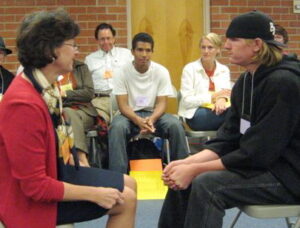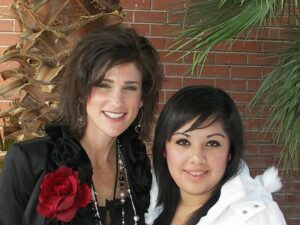Teens
Teen Intake
Our TPC program began with referrals from the school’s counselors office. Although efficient, we immediately realized this led to the selected students feeling “stigmatized.” They felt like they were chosen without any of their input. The question was often asked, “What do you think is wrong with me?”
From this learning and the teens’ lack of engagement, we developed a different process in which the students ONLY “self selected” for the program. This began, incidentally, their own self-empowerment.
Classroom Presentation
Short (15-minute) presentations introduced the concept of coaching to the students using questions and metaphors. Each presentation began with this question:
“What if you knew you could sit down with an adult who would listen to you about your concerns and your dreams? And what if that adult would never judge, criticize, or embarrass you but would only help you see how you might be able to succeed?”
The question immediately caught their attention and we paused and let it settle in.
We also used feedback we had gained from our initial cohort of students on what it’s like to be a teen today. Students themselves were asked to participate in a few brief elements of the presentation. This not only conveyed information about the coaching process but also got them engaged.
After the presentation, students were offered the opportunity to explore coaching further at our Teen Assembly without any obligation. Using 3×5 cards, they could anonymously register their decision by placing their name and simply checking “yes” or “no” or “maybe” on the card. The “yes” students were invited to the Teen Assembly, and the “maybe” students were contacted after they had likely heard exciting reports from their classmates attending the Assembly.
Orientation — What is Touch Point Connection?
Information for Teens — What is a Coach?
Teen Assembly
Each Assembly was interactive, fun, and engaging. After welcoming the teens and acknowledging their willingness to explore possibilities for their future, a brief explanation of what coaching is and is not was reviewed. Based on an exercise the students would later participate in, a demonstration was provided with one of the students and a trained coach. The students then connected in pairs and, aided by a simple form (see pdf below) “coached” each other.

The mood in the room shifted from “reserved curiosity” to “excitement”. At the close of the Assembly, the students were invited to fill out a 3×5 card (for anonymity) to signal a desire to be contacted for an interview or not. Not all teens joined the coaching program, but those who did were glad they took action!
What I want, what I don’t want
Teen Interview
The follow-up interview allowed each student to ask questions and learn more. The process often resembled a coaching conversation without that being the intent. If the student wished to proceed he or she received a permission form to be filled out by a parent or guardian to allow participation in the program.
Meet-Up (Teens + Volunteers)
Next, the Volunteer Success Coaches (VCs) and the teen had a Meet Up for the 1:1 (one-on-one) coaching program. No more than six pairs of Coach-Teens were present. This allowed us to maintain intimacy, provided time for questions, and gave the VCs and teens a chance to get to know each other.
Before the teens arrived at the Meet Up, the VCs would review:
- Their Agreement with TPC and sign it
- Issues of confidentiality, mandatory reporting and duty to warn, school policies and logistics, and requirements of Touch Point Connection.
When the teens arrived at the Meet Up, they were introduced to their respective coaches followed by:

- General introductions and review of what coaching is and is not. A student question and answer sheet about coaching was read by a VC for the group.
- An Ice-breaker exercise
- A VC read the teen interview
- Comments about confidentiality, mandatory reporting and duty to warn, school policies and logistics, and policies of Touch Point Connection were made for all to hear.
- Agreements between the Coach and the Teen were distributed and read. Each Agreement was to be reviewed and discussed and then signed at their first meeting prior to coaching.
- Each pair then took time to get to know each other and schedule of their coaching sessions.
Volunteer Coach pledge to Teen
Teen coaching experience interview


